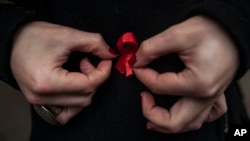Women make up the vast majority of people living with HIV in South Sudan, and face discrimination on a daily basis if they admit to having the illness, a woman who has had the virus for nearly 25 years said Monday on World AIDS Day.
"Women constitute three-quarters of the number of people living with HIV," Evelyn Letio, the chairwoman of the National Empowerment of Positive Women United in South Sudan said.
If living with the virus is not bad enough, women who publicly acknowledge that they have HIV or are dealing with the health-threatening symptoms of the AIDS syndrome face even greater problems, on several levels, said Letio, who is herself HIV-positive.
"There is discrimination from the family, in the community and the government, too," she told South Sudan in Focus.
"The few that are employed are sent off from jobs because they have declared they are HIV-positive," Letio said.
Different for women
South Sudanese society treats women who are infected with the virus differently than men who have the virus.
"When the woman is positive, they say it gives the right to divorce immediately and the woman is ordered out" of the family home, Letio said.
"She is ordered to leave and has no voice. If the man is positive and the woman is negative in a family, the woman is forced by law to stay and look after the man. This is the inequality we have as women living with HIV," she said.
The National Empowerment of Positive Women United in South Sudan encourages HIV-positive women to accept their health status and adopt a healthy lifestyle, which includes taking medication for HIV.
The group runs networks for women with HIV to share experiences and provide each other much-needed support and sets up partnerships with other organizations that encourage people living with HIV/AIDS to start a business so that they can earn a decent living.
Lately, financial support for HIV-positive women has been on the wane, Letio said. That is sending the wrong message to South Sudanese about the illness, she said.
"Funding has been diverted to emergencies... (People) believe now that they do not hear anything about HIV, they believe HIV has died," Letio said.
The mother of four children, Letio has been living with HIV for more than 24 years since her husband died in 1989. She accepted her fate and has lived a full life because she recognized that she needed to take care of her children.
But, she insisted, the government, South Sudanese civil society and the international community all need to chip in and financially empower HIV-positive women and provide homes for HIV/AIDS orphans in South Sudan.
According to UNAIDS, the HIV/AIDS prevalence rate in South Sudan last year was 2.2 percent. Around 150,000 people in South Sudan were living with HIV in 2013, including 18,000 children under the age of 15, UNAIDS says.





